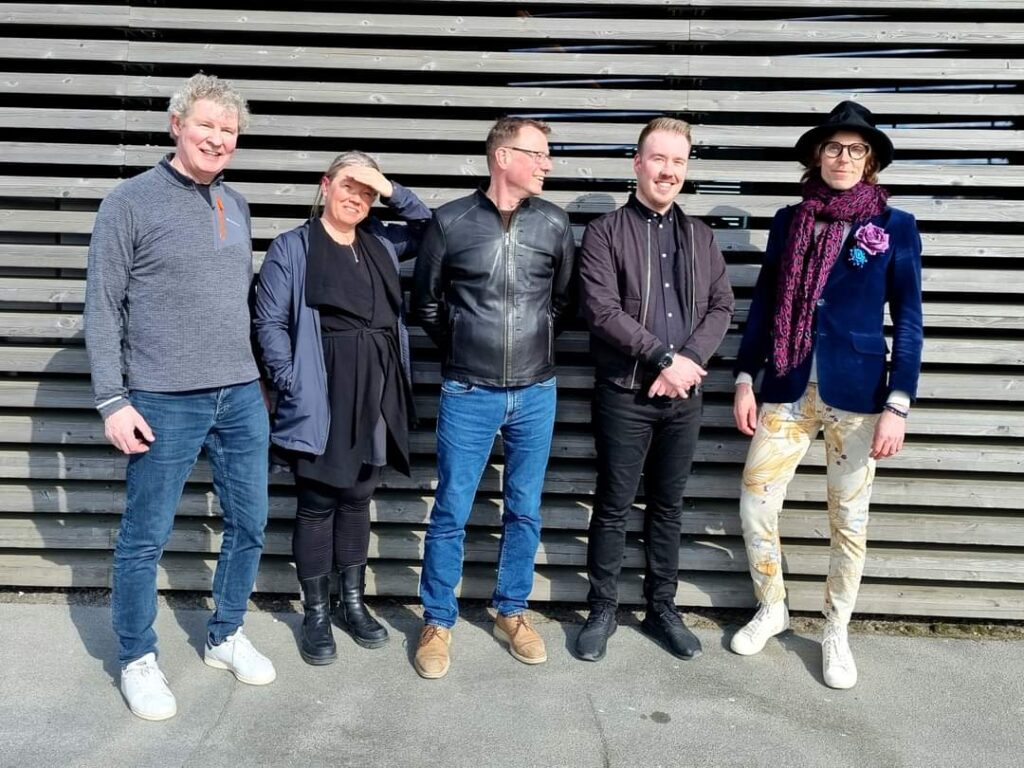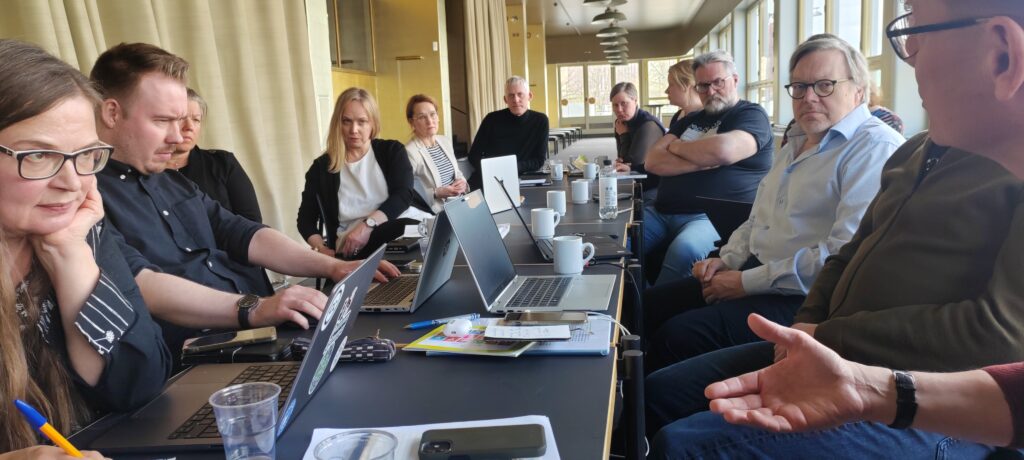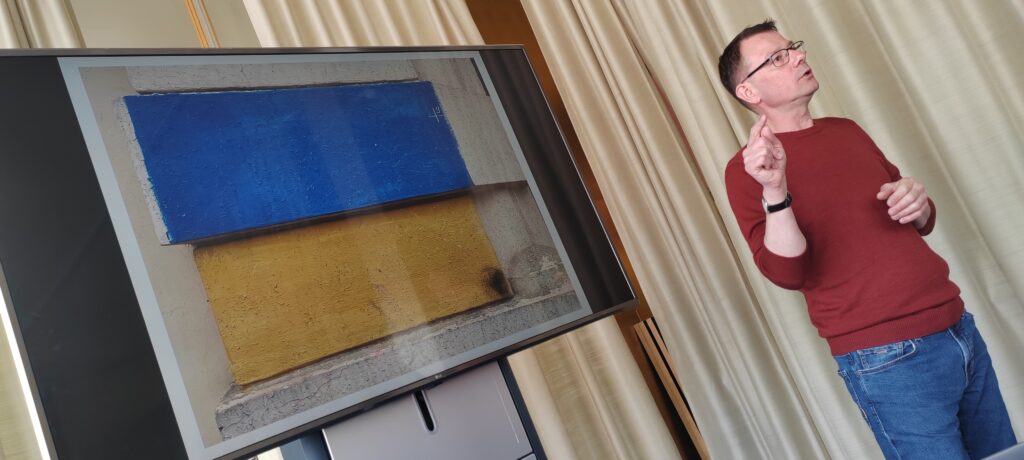
It was a Sunday evening in early May. The promise of summer threw its sunrays, allowing us to sit outside for welcome drinks, us being the ICOM Nord members, my colleagues from Sweden, Norway, Denmark and Iceland.
There, on a terrace beneath the Orthodox Cathedral as icebreakers returned to home port after winter’s work, we raised our glasses for the longstanding Nordic ICOM-cooperation, and for the two days of meetings ahead.
ICOM Nord has been around for a long time, that we know. But for how long exactly? The current members of the board don’t really know. I have learned from old documents still stacked in my office at the National Museum of Finland, that ICOM Finland was established in the 1940s, after the establishment of Icom and Unesco under whose umbrella Ioom operated.
As for Nordic cooperation, I’ve seen mentions from the 1970s. There must be a whole story in those ICOM Finland archives, still in an unorganized state. A story for somebody to discover and tell.
It’s a story of how a Nordic museum network took form, as a part of a broader story of how the worldwide network expanded. As father and son McNeill write in their book “The Human Web”, networks are part of how humans came to operate on Earth, first locally but then slowly, through separate nodules spun together. Distances shrunk as traveling became possible and communication developed. People got together, communities extended.
It’s quite hard to remain totally isolated and separate in today’s world.
What this means for museum professionals is that a worldwide museum network exists. It’s not all about ICOM, but our organization is the largest museum network in the world, consisting of national and international committees as well as regional alliances, such as ours. Together they form a pool of people with a shared understanding of what a museum is and how museums should operate as institutions and how museum professionals should act.
Museum Definition and Ethical Code for Museums are the twin cornerstones of our profession, and are the two main things ICOM “owns”.
Owns? I don’t like the sound of that. We don’t own anything – neither wordings, nor the collections we take care of in our museums. We don’t own the ways we use collections or make them available to the public. Heritage work is for the people, for all of us, and museum professionals are merely caretakers and facilitators. Actors perhaps, but not owners.
We have special training and rare privileges, responsibilities too. To preserve, share, facilitate. Create and act. It is important that the choices we make are based on commonly agreed principles and true communication with people, on whose behalf we maintain the objects and places in our care.
Monday in Helsinki dawned, sunny but chilly. As I stood outside Amos Rex museum to greet Itha O’Neill, ICOM Finland board member, host of the day’s meetings, a seagull flew past us, with a blue plastic bag stuck to its leg. Fighting, screaming, the bird struggled to free itself from an unwanted man-made intrusion to its life. A fitting image of the mark we’re leaving on our planet. We’re not alone here and cannot only think of us humans when making choices. Planetary wellbeing should be spun into our values.
Inside the gorgeous 1930s Glass Palace, in Amos Rex’s long foyer turned into a meeting room for the morning, we sat down with the ICOM Nord board and national committee representatives, to reorganize ourselves. Søren La Cour Jensen, the longtime ICOM Nord member and the chair since our establishment as an official Regional Alliance in Prague general conference in 2022, was stepping down.

Who is to take the position Søren carried so well?
I had decided to apply, and as it turned out I was the only one so that was it. Elina Nygård from Sweden, was elected to be the vice-chair, and Iceland’s Hólmar Hólm agreed to continue as secretary and Lasse Tjønnoy of Norway as treasurer. Søren continues to be the Danish representative. The substitutes of each country remained the same, Minna Sarantola-Weiss sharing with me the Finnish position, Håkon Roland for Norway, Josephine Nielsen-Bergqvist for Denmark and Helena Westin from Sweden.
So that’s the ICOM Nord board, which is complemented by the chairs of all National committees, and this time in Helsinki, several board members of ICOM Finland joined and Kai Lobjakas, the chair of ICOM Estonia too, who was there for discussions about possibly expanding the Nordic alliance. Also, Carina Jaatinen, the treasurer of ICOM and a member of the Executive Board, was there part of the time to give news from the Paris headquarters and take back Nordic views.
To start with, we went through some ten years of ICOM Nord history, since Oslo 2014. We’ve been to Nuuk Greenland, in a conference with indigenous focus. There was Kristiansand, Norway, where the You shall be heard -conference set us in our journey to ethics discussions, which culminated a few years later in Helsingborg, Sweden, where the Difficult Issues -conference took place, the largest feat ICOM Nord has done, at least while I’ve been around. A precedent for what we aim to do in the years to come, that large event.
And ethics is what we’re into still, very much.
Do we share the same principles and understanding after all? Those twin cornerstones, how solid are they, really?
During our days in Helsinki, we had a chance to look at Ukraine. Søren had been there as a part of a film crew to witness the human catastrophe happening there but also the destruction of cultural heritage sites and museums. It’s very real and it’s being documented well. Russian museum professionals, ICOM members perhaps many of them, are participating in actions, which clearly violate international laws and the code of ethics.

Our code of ethics. This we talked about a lot. What’s to happen, what are the consequences for such actions and for those among us who violate our code of ethics ? And how? Are there precedents for being dismissed from ICOM? Would that be the way to go?
How does international law protect in conflicts? Or commonly agreed ethical codes?
Targeting cultural heritage sites and places of importance to communities has been part of military strategies since forever, even of those, which are protected by the Hague convention, world heritage sites even. There are sad precedents in the not-so-distant past, the siege of Dubrovnik and destruction of the Mostar bridge in the Balkan wars in the 1990s come to mind.
There’s also the case of Timbuktu, Mali, 2012, which resulted in individuals being charged with war crimes against cultural monuments, and tried in the International Criminal Court (ICC) . Very first case, that one.
What will happen in the case of the war in Ukraine?
As always, and in Icom circles in particular, the world is so much larger than it appears in our own small corner of the world. This applies to all.
Ukraine is just one of many active military conflicts in the world. There are other conflicts), on this planet of ours, where those networks don’t look secure any more. It’s as if the nodules are separating once more. Are they?
Is that happening in the museum world too?
The most important gathering for us ICOM people is the General Conference, where all the committees meet every three years. It’s in a place which is voted, according to the procedures of our democratic organization, by the general assembly that consists of committees and members from across the world.
This time the vote yielded Dubai as the winner of the contestants.
ICOM is a democratic organization, and there’s not much to say about the vote. It means that a large share of ICOM members worldwide wanted to have the Conference take place in Dubai. It is perhaps very accessible to many members, and it’s an Arab country. It’s never been held in the Middle East, and there’s value in that, to finally bring ICOM’s spotlight to that part of the world..
Still, it’s an uneasy result for many, because the world, united or not, does not share the same values. The United Arab Emirates is a very different place than our Nordic countries, for instance. Different legislation, different culture, different habits. Values.
What about the human rights violations, for instance, we heard about before the Football World Cup in Qatar. The reports were disturbing. Should this event be boycotted as well?
How’s it going to be for our members in Dubai? Sexual minorities for instance, whose very existence might be codified against in the criminal law of the United Arab Emirates.
We must ask these questions, among other things, and this is what we decided to do as ICOM Nord, and to organize online events for discussions about the upcoming conference.
It is essential to talk and keep talking. I’ve lived and traveled in the Middle East and North Africa, but I can’t say I know many museum professionals there. This is the main reason I have chosen to go to Dubai. To meet the people, talk, share, leave thoughts there and take some back. In my view, boycotting isn’t a good option, and it is not in the interest of networks to not meet with others, no matter how different their values may be.
‘We have to stand for our values’, Atle Ove Martinussen, the chair of ICOM Norway, said when we talked about Dubai at the Helsinki City Museum on the second day of our meeting. Agreed, but we cannot expect the rest of the world to share the exact same values. We cannot only deal with those who are similar to us. If we chose to do so, our network would be very small.
We must stand for our values, yes, but not to close ourselves off. Something like value-based realism, that’s maybe the way to go.
The best thing about ICOM, in my experience, is that it is a truly global network that brings people from all corners of the world together, virtually and in real life, as will happen in Dubai next year. For me, being an ICOM active has burst my bubble, in a good way. The way things are up here is not the way they are in most parts of the world, and our way is not always the right or often only another way. On the contrary, it’s a privileged wealthy way not shared by everybody.
I wrap up this blog post, quite lengthy by now, on summer’s evening in Helsinki. It’s scorching hot. (We do need to take care of this planet of ours, use our museum platforms to promote sustainability, both natural and cultural.) I have just come back from the World Village festival, which is the multicultural gathering I’ve grown fond of participating in every year because of the feeling of being part of something, understanding that the world is within our reach.
On that day in the World Village I went to see the Tunisian artist Emel, whom I’ve followed since the Arab spring uprisings in 2011. Now she was in Helsinki, her words of peace, and as I was hearing this, I longed to be there, in Dubai or wherever this network takes me, in real life and in spirit.